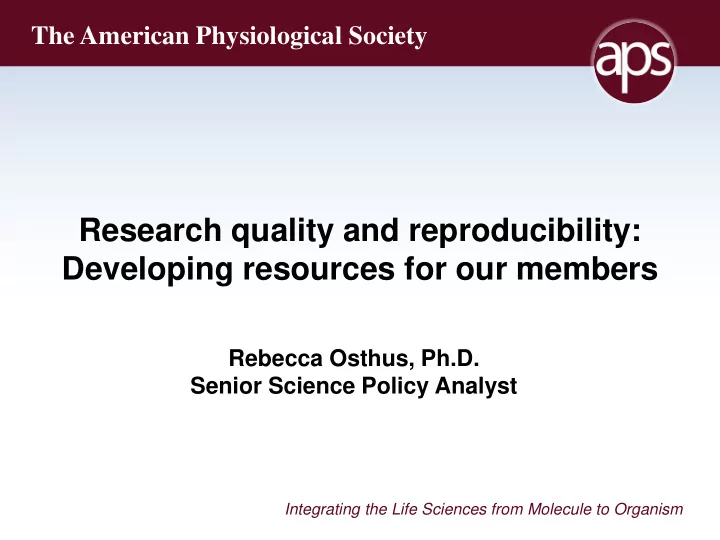

The American Physiological Society Research quality and reproducibility: Developing resources for our members Rebecca Osthus, Ph.D. Senior Science Policy Analyst Integrating the Life Sciences from Molecule to Organism
Who we are American Physiological Society has ~11,000 members who carry out basic physiological research in labs around the US and internationally Physiology has a role in pre-clinical and translational research Many of our members use animal models Member of FASEB Integrating the Life Sciences from Molecule to Organism
Understanding the problem 2012-2014: data comes to light showing lack of reproducibility Leaders in the scientific community, the scientific and lay press, and Congress have all taken notice Risk of undermining public support for research Integrating the Life Sciences from Molecule to Organism
H.R. 34: 21 st Century Cures Act ENHANCING THE RIGOR AND REPRODUCIBILITY OF SCIENTIFIC RESEARCH “…the Director of the National Institutes of Health, shall convene a working group under the Advisory Committee to the Director … to develop and issue recommendations through the Advisory Committee for a formal policy … to enhance rigor and reproducibility of scientific research funded by the National Institutes of Health. Integrating the Life Sciences from Molecule to Organism
Reaching our members Members of the scientific community have questions, among them, what does it mean to acknowledge this problem? Lack of research reproducibility does not equal research misconduct Integrating the Life Sciences from Molecule to Organism
April 2015 Science Policy Committee Symposium Reproducibility in Research: What are the problems? How can we fix them? What happens if we don’t? Shai Silberberg, Malcolm Macleod, Richard Nakamura Resources: Journal club activity, recordings of presentations, video interviews Integrating the Life Sciences from Molecule to Organism
FASEB Report: Enhancing Research Reproducibility Goal of developing recommendations for stakeholder groups Symposium and series of roundtables focused on animal models, antibodies, developing recommendations Industry, academia, professional societies, publishers and others Available on the FASEB website: www.faseb.org Integrating the Life Sciences from Molecule to Organism
Over-arching recommendations Stakeholders should use precisely defined terms and definitions (offered in report) The inability to reproduce research findings may result from lack of sufficient detail in reporting Rigorous and transparent research is dependent on good research practices by all participants Integrating the Life Sciences from Molecule to Organism
2017 Science Policy Committee Symposium Why scientific rigor matters and ways to improve it Kristine Willis (NIH perspective) Bradley Yoder (UAB training course) Curt Sigmund (APS Publications) Tracey Weissgerber (Mayo; statistics and data visualization) Resources: Reproducibility Toolbox handout (pdf), recordings of presentations Integrating the Life Sciences from Molecule to Organism
Data visualization Physiologists working with animal models often use small sample sizes
APS Publications 14 peer-reviewed journals Publications chair participated in APS and FASEB efforts Committee developed new guidelines in information for authors Authors are encouraged to enhance reporting Integrating the Life Sciences from Molecule to Organism
APS professional skills training course “Controls in Animal Studies Professional Skills Course” Create a teaching module that develops skills in designing, analyzing, and reporting well- controlled animal studies, and to establish a community of practice for researchers using animal models NIH Clearinghouse for Training Modules to Enhance Data Reproducibility Integrating the Life Sciences from Molecule to Organism
NIH/FASEB Conferences Workshop Work presented at scientific meetings provides only a snapshot, can be difficult to evaluate information presented Call for ongoing efforts to improve communication at conferences Need for guidelines to promote transparency Integrating the Life Sciences from Molecule to Organism
FASEB piloting “rigor emojis” 2 small conferences Survey found that awareness was low, both for emojis and NIH policies Continue in 2018 with updated guidance for their use Nature Commentary Nature 548, 153–154 (10 August 2017) doi:10.1038/548153a Integrating the Life Sciences from Molecule to Organism
Resources www.the-aps.org/reproducibility APS Publications Information for authors FASEB resources (www.faseb.org) Enhancing reproducibility report Link to Nature commentary Integrating the Life Sciences from Molecule to Organism
Future plans Launch of professional skills training on animal controls EB 2018 symposium in San Diego: Avoiding common pitfalls in preclinical animal research design Partnerships to enhance data visualization in our publications Integrating the Life Sciences from Molecule to Organism
Contact information Rebecca Osthus 301-634-7254 rosthus@the-aps.org www.the-aps.org/reproducibility @scipolaps www.faseb.org Integrating the Life Sciences from Molecule to Organism
Recommend
More recommend